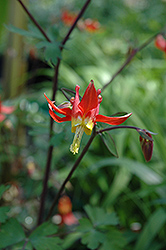Height: 30 inches
Spread: 24 inches
Sunlight:
![]()
![]()
Hardiness Zone: 3
Other Names: Crimson Columbine
Description:
Elegant crimson-red flowers with yellow throats nod graciously over the medium green delicate foliage; a wonderful addition to border edges or massed in the garden; will self seed
Ornamental Features
Western Columbine features showy nodding crimson bell-shaped flowers with yellow eyes at the ends of the stems from late spring to mid summer. The flowers are excellent for cutting. Its lobed compound leaves remain green in color throughout the season.
Landscape Attributes
Western Columbine is an herbaceous perennial with an upright spreading habit of growth. It brings an extremely fine and delicate texture to the garden composition and should be used to full effect.
This is a relatively low maintenance plant, and should be cut back in late fall in preparation for winter. Deer don't particularly care for this plant and will usually leave it alone in favor of tastier treats. Gardeners should be aware of the following characteristic(s) that may warrant special consideration;
- Insects
Western Columbine is recommended for the following landscape applications;
- Mass Planting
- Rock/Alpine Gardens
- Border Edging
- General Garden Use
- Groundcover
- Naturalizing And Woodland Gardens
- Container Planting
Planting & Growing
Western Columbine will grow to be about 24 inches tall at maturity, with a spread of 24 inches. Its foliage tends to remain dense right to the ground, not requiring facer plants in front. It grows at a medium rate, and under ideal conditions can be expected to live for approximately 5 years. As an herbaceous perennial, this plant will usually die back to the crown each winter, and will regrow from the base each spring. Be careful not to disturb the crown in late winter when it may not be readily seen!
This plant does best in full sun to partial shade. It does best in average to evenly moist conditions, but will not tolerate standing water. It is not particular as to soil type or pH. It is somewhat tolerant of urban pollution. This species is not originally from North America. It can be propagated by division.
Western Columbine is a fine choice for the garden, but it is also a good selection for planting in outdoor pots and containers. With its upright habit of growth, it is best suited for use as a 'thriller' in the 'spiller-thriller-filler' container combination; plant it near the center of the pot, surrounded by smaller plants and those that spill over the edges. It is even sizeable enough that it can be grown alone in a suitable container. Note that when growing plants in outdoor containers and baskets, they may require more frequent waterings than they would in the yard or garden.
